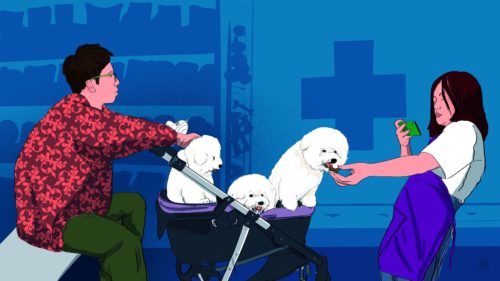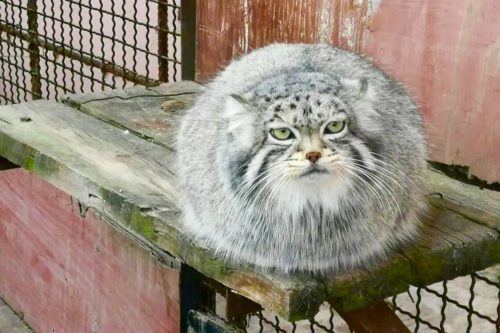The rise of luxury pet hotels
China’s new middle class is increasingly falling for felines and finding comfort in canines.
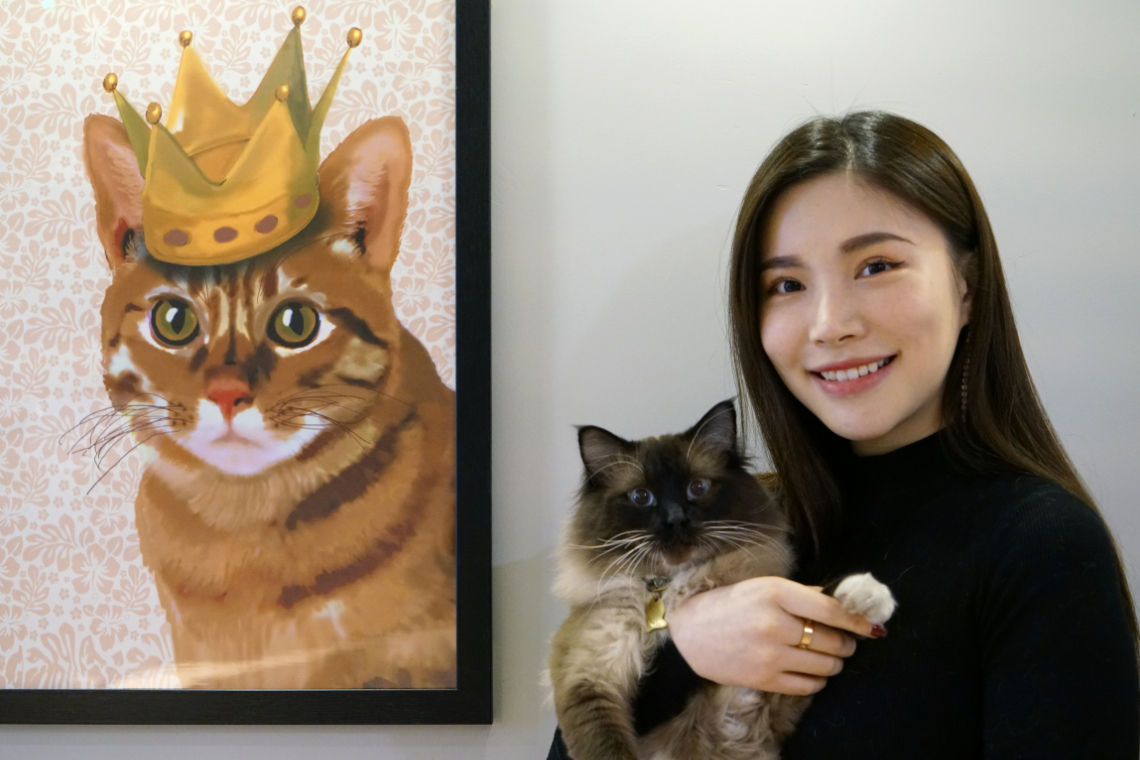
BEIJING – Wang Xiaomeng is preparing for her “son” Nian Nian’s upcoming birthday party.
She has already bought him a hat as a present, and is researching birthday cakes online. “Of course, I organized one for him last year, too,” she says. “He has three siblings, but only one of them turned up. I guess it’s not so popular in China to hold birthday parties for cats yet.”
Xiaomeng, a 27-year-old Beijing-based designer, describes her tabby Scottish fold cat Nian Nian as her “kid” and herself as a mao nu (猫奴 māo nú), meaning “cat slave.” She is outlining her feline’s birthday plans while sitting in Vacation A Cat (VAC): a luxury hotel exclusively for cats that opened in the summer of 2016 in the Chinese capital.
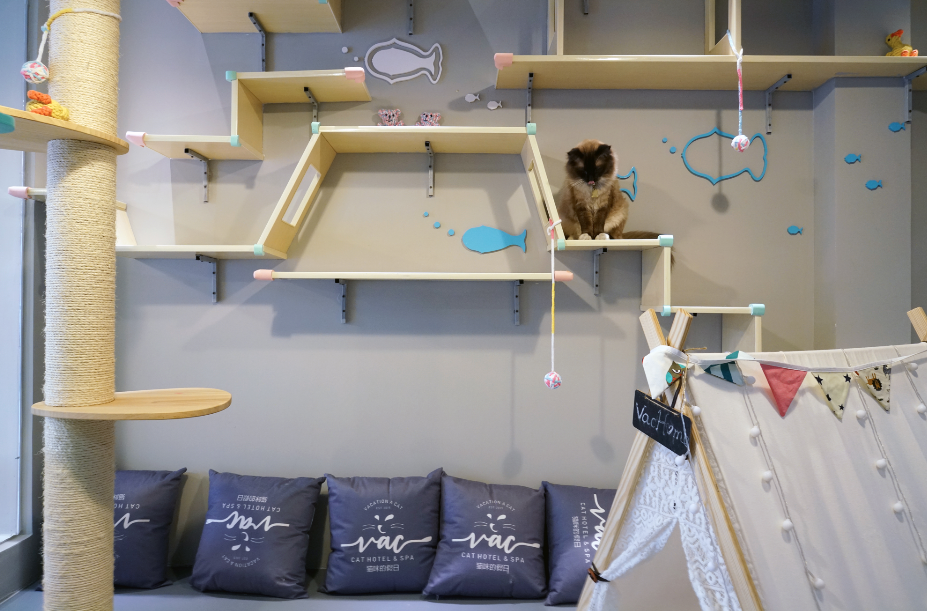
Birthday parties for cats may not be widespread in China quite yet, but the opening of VAC, one of many new high-end pet hotels in the country, is an indicator of how luxury pet obsession is becoming increasingly common in big cities.
Nian Nian is visiting VAC to make use of its spa facilities. The full service — grooming, bath, pedicure, massage — costs around 550 yuan ($81), depending on hair length. The image of Nian Nian’s newly perfume-scented fur being gently brushed by VAC’s dedicated groomer is a striking indicator of how vastly attitudes toward pets have changed in China, since they were banned by Mao Zedong for being too bourgeois.
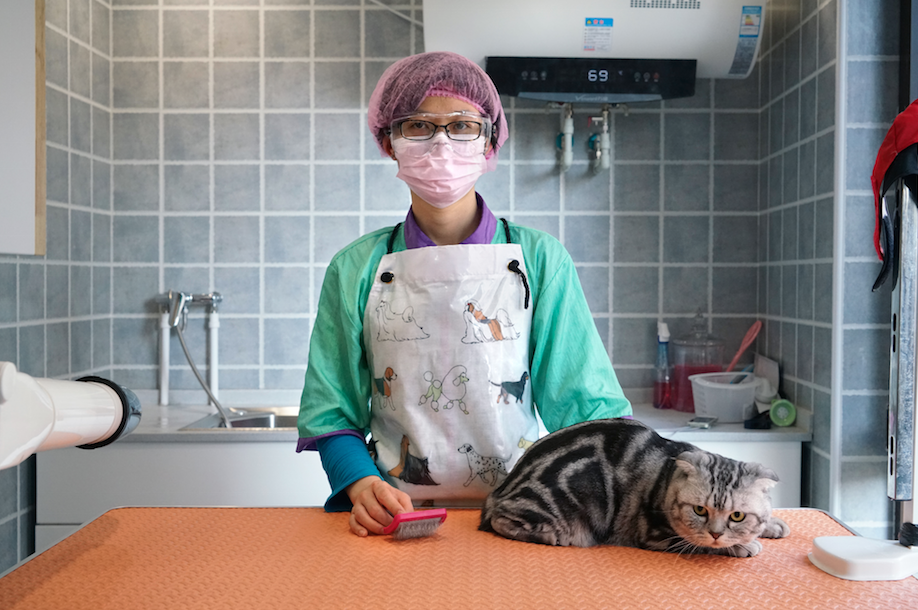
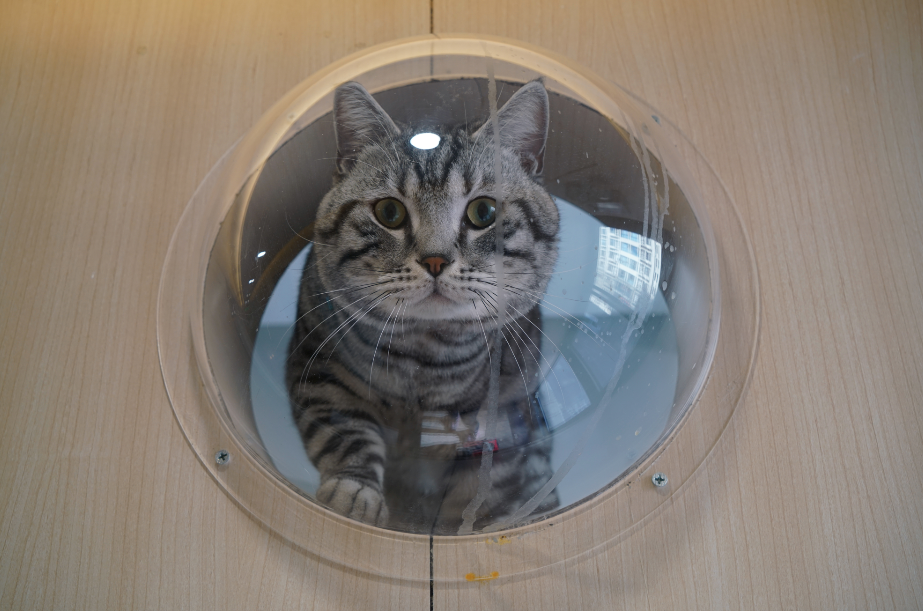
From the handbag-housed Chihuahuas of Los Angeles to the designer dogs of London, spoiled pets are nothing new in many Western countries. But a few years ago, you would have struggled to find a cat hotel offering pedicures and massages in China.
The increased spending power of China’s middle class over the past decade, combined with restrictions on dog ownership being relaxed and influence from the U.S. and Japanese luxury pet industries, has led to something of a boom in both cat and dog hotels in China.
A new kind of luxury
In January, Chinese state media heralded the trend with an article entitled “Luxury hotels for furry guests boom” on the front page of the China Daily newspaper. Euromonitor has forecast that by 2019, the wider pet industry in China will be worth 15.8 billion yuan ($2.3 billion), overtaking the U.S. to be the most lucrative in the world.
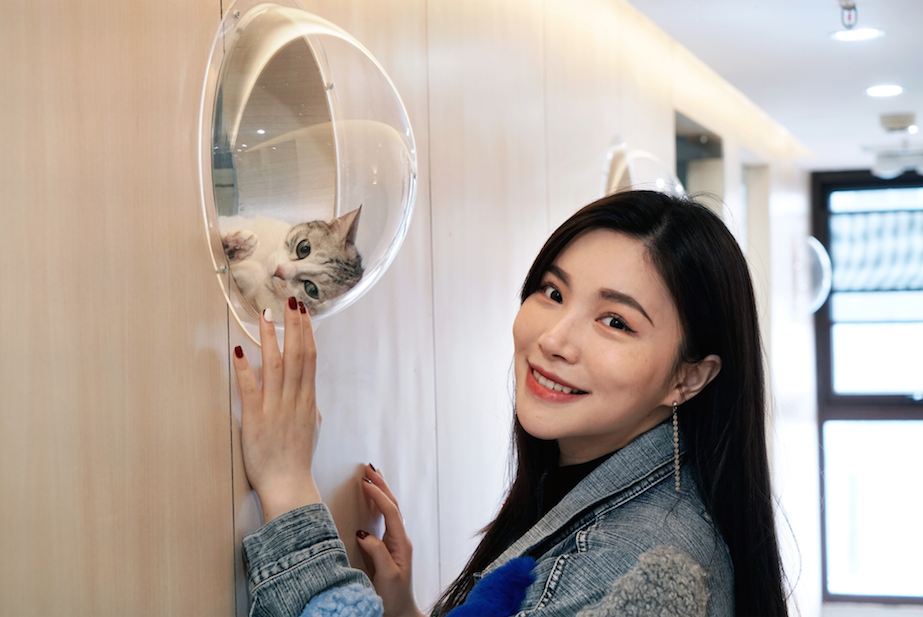
“The concept of pets is not as developed here as it is in Europe and America, but China is starting to have a concept where pets are seen as family members,” says Vivi Wang, the 25-year-old owner of VAC. “It’s happened as the economy has gone up and people have had more money to spend,” she adds, stroking her impeccably groomed brown ragdoll cat Fluffy.
Does Fluffy get treated like a child? “Of course!” says Vivi as her cat calmly licks its paws while sitting on her lap. Vivi has two more cats at home: “Fluffy is my third boy.”
When asked how much a room at VAC costs, Vivi raises an eyebrow and explains that she has 15 “suites,” rather than “rooms,” which cost 350 yuan ($52) a night for single occupancy. The “suites” are spacious and impeccably clean, with plentiful toys. Vivi’s staff takes video footage of the cats each day and sends it to their owners via WeChat, China’s hugely popular messaging app, so they can be reassured that their loved ones are suitably pampered.
“Most of my clients are young and well educated, they are able to spend,” says Vivi. She doesn’t expect the trend to end soon, so she is opening another hotel in Beijing for both cats and dogs and planning a Shanghai venue. “Customers’ standards are getting higher and higher.”
Cakes for dogs
Further confirmation that the year of the pampered dog and cat has arrived in urban China is found in Beijing’s trendy shopping area, Sanlitun. Inside the swanky Soho shopping mall lies SmellMe: a dog and cat hotel, grooming center, shop, and café.
A fridge full of cakes for dogs stands by SmellMe’s coffee area, which serves 38 yuan ($5.60) cappuccinos with the froth whipped into the shape of smiling felines. Cats stroll inside see-through tubes hanging from the ceiling, while designer-clothes-clad customers tug pedigree pooches around the shop area.
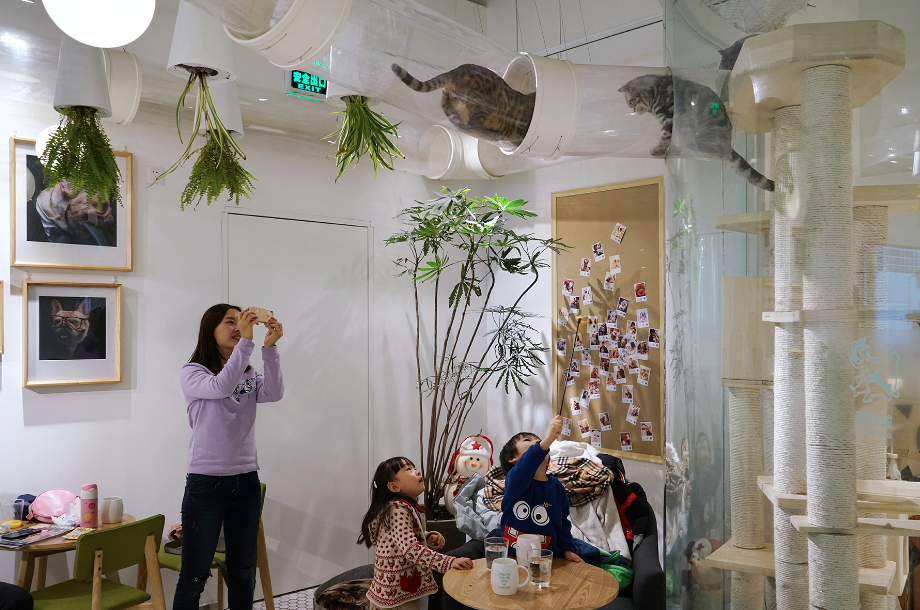
SmellMe opened as a physical base for its corresponding smartphone app, launched in 2013 to cash in on this new generation of cash-splashing pet owners by providing a luxury concierge service of sorts for dogs. The app, which trades on its exclusivity, has around 200 local users, each having to load at least 6,000 yuan ($885) into it to be spent on everything from dog medical services to walking sessions.
“Concepts toward pets are changing here,” says Sun Yan, co-founder of SmellMe. “It’s getting closer to Western countries. Chinese are treating pets like kids and the number of pet owners is growing by about 20 percent annually.”
Yan said there was more to this rise than improved spending power. “The biggest reason is actually pressure from urban life. Another reason is that people in cities have a huge demand for feelings and emotions. We see a lot of single men and women who need to fill this gap.”
“She cooks for the dog — but not for me”
Xu Hongyong, a 30-year-old investment banker, was hanging out in SmellMe with his French bulldog Geng Geng. He admitted that his dog was a status symbol, but also that it did indeed help fill emotional gaps — for his girlfriend, rather than for him.
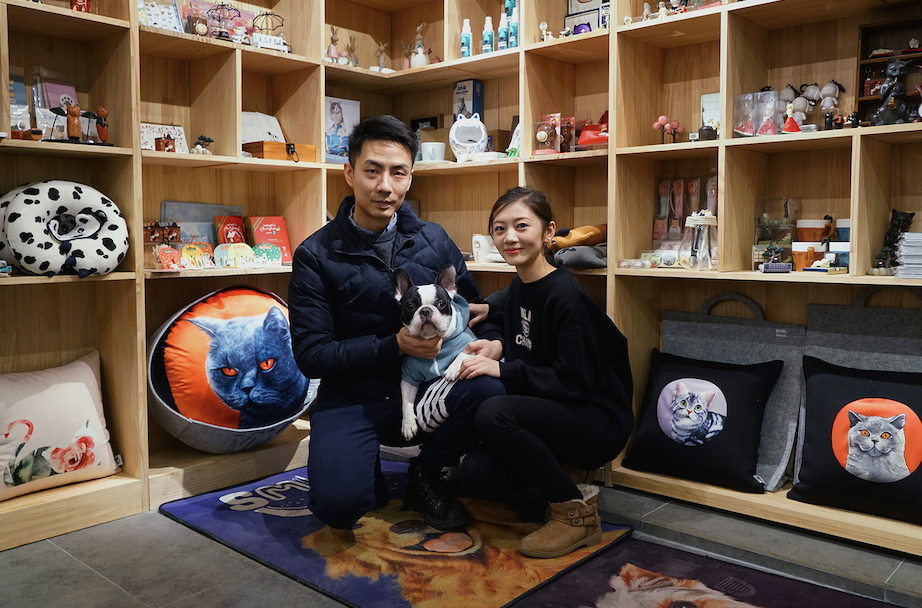
“It’s very Chinese to be like this, but for me, the most important thing in life is earning money,” he says, showing me a map on his phone documenting the hundreds of business trips he took in 2016. “Everything is expensive. If I don’t have money, then the dog, the girlfriend, everything [goes].”
There is more to Geng Geng than being a furry indicator of how much money its owner earns, though. “I worked almost 300 days away last year — something needs to keep my girlfriend company,” says Hongyong. “So the dog is very important.”
Before he left to find his girlfriend, who had disappeared into the designer shops of the Soho mall, Hongyong gave a bit more insight into life at home. “My girlfriend treats the dog like a child — and its clothes cost more than mine,” he says, laughing and wincing. “And she cooks for the dog — but not for me.”
I ask how much money the couple spends on Geng Geng, as a droplet of drool falls from the dog’s mouth onto the gleaming white floor of the SmellMe lobby. “That’s a secret,” says Hongyong, then heads into the mall.
Mao might not have approved, but China’s pet culture revolution has clearly got legs.



